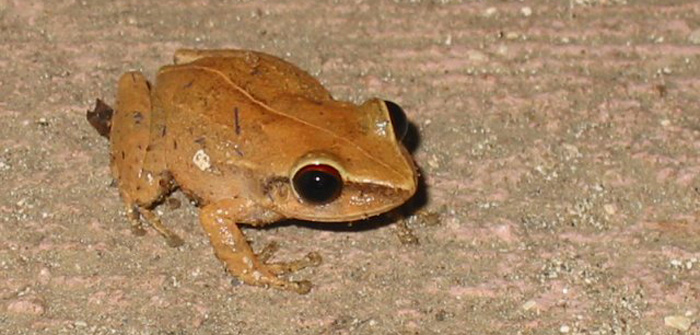Amphibians around the world have been devastated by the spread of the deadly fungus Batrachochytrium dendrobatidis (Bd). But although many populations have been decimated, others have survived the same threat. One reason for such different outcomes is variation in virulence between Bd isolates. In the latest issue of G3, Refsnider and Poorten et al. investigate Bd virulence changes by taking advantage of the rapid evolution that can take place in the lab.
The authors studied a strain isolated in 2005 from an infected frog found in the El Yunque rainforest, Puerto Rico; one isolate was frozen soon after, while a second isolate was maintained in laboratory culture for six years. Today, the isolate that has grown used to lab life is significantly less lethal to frogs. Studying the genetic basis of this shift may shed light on how virulence is attenuated in the wild, particularly because many of the confounding factors inherent in natural systems can be controlled for by comparing two isolates from a single lineage.
The authors resequenced the pair of isolates to look for genomic changes underlying the phenotype difference. They found that the two strains had diverged at a rate of 1.6 x 10-5 mutations per site per year, which is faster than most fungi but similar to other fungal pathogens. The less virulent isolate had lower chromosomal copy numbers than its wilder cousin, suggesting one way that virulence can be rapidly lost. The extra chromosome copies needed for virulence may become costly to the pathogen once normal selection pressures have been relaxed.
The speed of Bd’s change in the lab suggests this pathogen is capable of rapid adaptation to new conditions, consistent with its alarming spread across habitats and continents.
CITATION
Refsnider, J. M., Poorten, T. J., Langhammer, P. F., Burrowes, P. A., & Rosenblum, E. B. (2015). Genomic Correlates of Virulence Attenuation in the Deadly Amphibian Chytrid Fungus, Batrachochytrium dendrobatidis. G3: Genes| Genomes| Genetics, 5(11), 2291-2298 doi:10.1534/g3.115.021808
http://www.g3journal.org/content/5/11/2291.full













